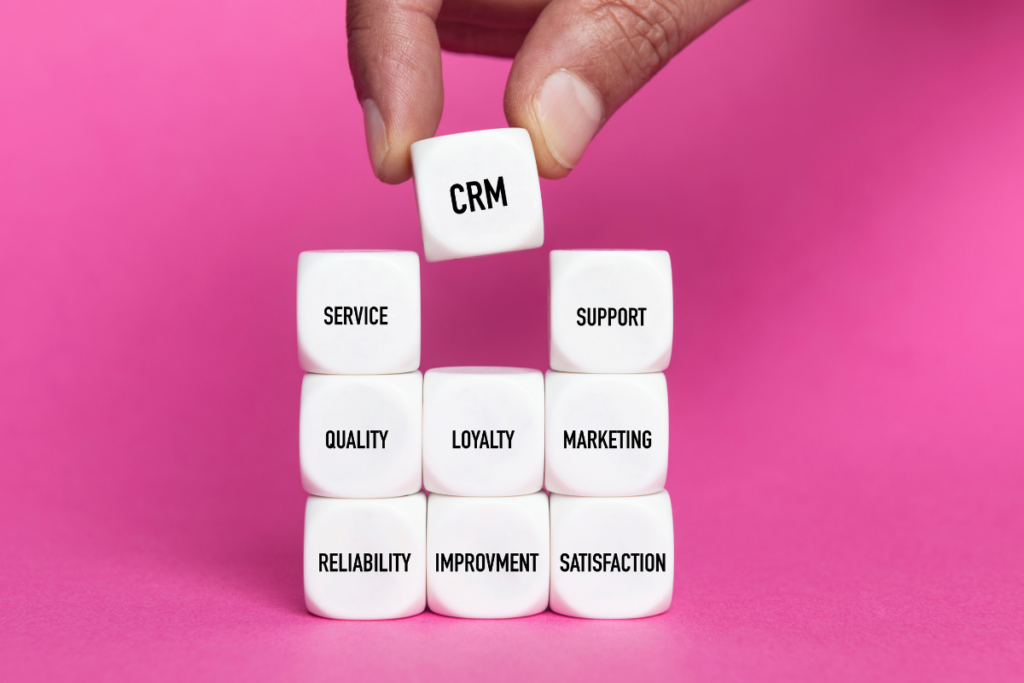Good CRM software changes everything: it makes customer relations more fluid, simplifies sales management and makes your marketing more effective. With detailed reports and a clear view of your business, you can make the right decisions at the right time!
Customer relations: 8 steps to choosing a CRM
Imagine a tool that intelligently collects all your customer interactions – emails, calls, appointments, purchases – and organizes them like a maniacal librarian. That’s exactly what a CRM software (Customer Relationship Management) software.
But beware: a CRM is not simply a glorified address book. Rather, it’s :
- An infallible memory that never forgets a customer detail
- A sales assistant who reminds you when to follow up a prospect
- A marketing analyst who identifies hidden trends
To optimize your customer relations choosing the best CRM is essential. Discover the 8 key steps to selecting the solution best suited to your needs:
1. Why implement CRM software?
CRM software is not a simple tool, but a strategic lever for centralizing, analyzing and optimizing your customer relations. Before making a choice, it’s essential to check that the CRM’s strengths match your priorities, so you can get the most out of it. Good CRM software offers the following advantages:
- Saving time: a CRM enables you to automate sales follow-up and centralize all information – purchase history, calls, preferences – making it accessible at the click of a button, like an infallible memory of your customer relations.
- Loyalty: by knowing your customers better (anniversaries, past needs), you can personalize your interactions and strengthen their commitment.
- Boosted sales: CRM software identifies opportunities (prospects to follow up, abandoned shopping baskets) and automates repetitive tasks.
- Informed team management decisions: thanks to detailed reports and analyses, you can measure what’s working and adjust your strategy to optimize collective performance.

2. Identify the right CRM software for your business
Before choosing CRM software, first determine whether it should be hosted in the Cloud or installed locally (On-Premises). The Cloud offers immediate accessibility, with no technical maintenance, ideal for companies looking for a scalable solution. On the other hand, an On-Premises CRM is better suited to structures requiring total control over their data, despite higher installation costs.
Next, define its purpose: an operational CRM optimizes business processes, an analytical CRM uses data for strategic insights. strategic insightswhile a collaborative CRM improves coordination between teams.
Finally, the size of your company influences your choice. Small and medium-sized businesses will prefer simple, cost-effective tools, while large groups will opt for powerful, customizable platforms.

3. Prioritize the key features of your CRM software
The success of CRM software depends on its ability to meet your company’s exact business needs over the long term. To avoid solutions that are too generic or overloaded, first identify the non-negotiable functionalities:
- Contact management: centralized, detailed tracking of each customer (history, preferences, interactions).
- Sales automation: opportunity tracking, automatic follow-ups and pipeline management to streamline sales.
- Analysis tools: customizable reporting and dashboards to measure performance.
- Integrations: compatibility with your existing tools (email, ERP, social networks).
For marketing teams, prioritize segmentation and campaign tracking. For after-sales service, opt for a ticketing system and knowledge base.
The objective? Choose a CRM solution that fits your processes, not the other way around.
4. Check CRM software compatibility and integrations
CRM software never works in isolation. Its ability to communicate with your other business tools (ERP, billing softwareand marketing tools, etc.) is crucial to avoid data silos and gain in efficiency.
- Check out the native connectors: several solutions offer turnkey integrations with hundreds of popular applications (Microsoft 365, Google Workspace, Mailchimp).
- Open APIs: for specific needs, make sure that your CRM software has a robust API that enables custom developments.
- Real-time synchronization: avoid time-consuming, error-prone manual export/import solutions.
Don’t overlook this point: poorly integrated CRM software can create more problems than it solves.
5. Ensuring data security and confidentiality
In a context where cybersecurity and the RGPD are inescapable, the choice of CRM software must integrate absolute rigor on the data protection. Here are the key points to consider:
- Data encryption: check that information is encrypted in transit (HTTPS) and at rest (secure storage).
- Certifications: opt for ISO 27001, SOC 2 or RGPD-compliant solutions
- Access control: CRM software must enable fine-grained rights management (who sees/modifies/what data?) and include strong authentication (2FA).
- Server localization: if your customers are in Europe, make sure data is hosted in the EU to avoid legal risks.
CRM software is a digital safe: its robustness has a direct impact on your customers’ trust and your reputation.
6. Optimizing the user experience for successful adoption
CRM software, no matter how powerful, will fail if your teams don’t use it properly. User experience (UX) therefore becomes a strategic criterion:
- Intuitive interface: clear navigation, logical menus and clean design.
- Learning curve: estimate the training time required. Good CRM software offers built-in tutorials and responsive support.
- Customization: the tool must adapt to your processes, not the other way around (modifiable fields, configurable dashboards).
Don’t underestimate this factor: a poor UX generates frustration and rejection.
7. Evaluate CRM's reputation and reliability
Before making a final decision, it’s essential to carefully examine the reputation of the CRM you’re considering. Start by consulting user testimonials and reviews on specialized platforms, which often reveal the solution’s concrete strengths and weaknesses.
Pay particular attention to the publisher’s financial stability, as this will ensure the longevity of your investment. A solid supplier is more likely to offer regular updates and reliable technical support over the long term.
Look also at CRM’s capacity for innovation: a solution that regularly integrates the latest technological advances (such asartificial intelligence for ERP or collaborative tools) will be more future-proof.
Last but not least, make sure it’s adopted in your specific sector of activity, as some CRMs are particularly well-suited to particular professions or company sizes.
8. Test the CRM before you commit
Never choose a CRM without first trying it out. Most publishers offer free trial versions – take advantage of them to :
- Involve your teams: sales, marketing and after-sales service teams must test the tool in their real-life processes.
- Verify adoption: an intuitive interface and relevant features encourage daily use.
- Test integrations: make sure CRM communicates seamlessly with your other tools.
This test will reveal any sticking points and confirm (or not) whether your needs are being met.
Furious: when CRM and ERP become one
Imagine a tool where your CRM is no longer that isolated piece of software that forces your teams to juggle five other applications. Furious ERP revolutionizes this approach by offering a unified platform focused on customer relations, where all company functions integrate naturally.
The real added value of Furious ERP tool? Its various modules (project management, staffing, reporting and CRM) can be harmonized effortlessly. There’s no need to re-enter information or make risky exports/imports. When a salesperson registers a sale in Furious, logistics is alerted, invoicing is pre-filled, and customer service has access to the entire history.
The future of customer relations? Their name is Furious
Choosing a CRM means choosing the tool that will shape your customer relationships. Furious exceeds this promise by integrating an intelligent ERP, for synchronized global management. No more silos, no more wasted time – just a unified platform to support your growth.
